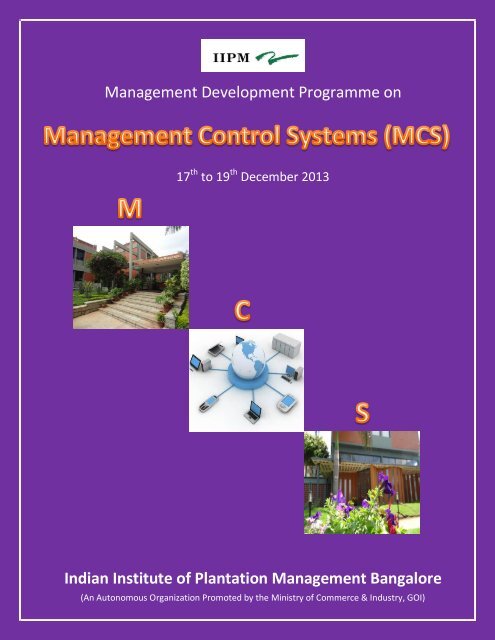Programme Brochure - Indian Institute of Plantation Management
Programme Brochure - Indian Institute of Plantation Management
Programme Brochure - Indian Institute of Plantation Management
Create successful ePaper yourself
Turn your PDF publications into a flip-book with our unique Google optimized e-Paper software.
<strong>Management</strong> Development <strong>Programme</strong> on<br />
17 th to 19 th December 2013<br />
<strong>Indian</strong> <strong>Institute</strong> <strong>of</strong> <strong>Plantation</strong> <strong>Management</strong> Bangalore<br />
(An Autonomous Organization Promoted by the Ministry <strong>of</strong> Commerce & Industry, GOI)
Introduction<br />
<strong>Management</strong> Control Systems (MCS)<br />
17 th to 19 th December 2013 (Three Day Non-Residential <strong>Programme</strong>)<br />
All enterprises strive to successfully realize their mission. To achieve the mission, enterprise<br />
management allocates resources to achieve the pre-planned targets in terms <strong>of</strong> sales turnover,<br />
pr<strong>of</strong>itability, higher returns on investments etc. In real operations, each business entity has to<br />
compete with every other enterprise in the business environment. Business and economic<br />
environment is open and full <strong>of</strong> competition. Every product/service has to compete with every<br />
other product/service to gain the confidence <strong>of</strong> its customers to realize the dreams <strong>of</strong> making<br />
pr<strong>of</strong>its and wealth maximization. A properly designed and implemented <strong>Management</strong> Control<br />
Systems (MCS) aids in the realization <strong>of</strong> targets leading to pr<strong>of</strong>itable performance. An effective<br />
MCS helps the concerned mangers to achieve targets on a continuous basis in the dynamic<br />
business scenarios. An effective MCS establishes efficient and effective linkages among all the<br />
functional departments – Production, Marketing, Finance etc. Such MCS needs to be effective<br />
across the all levels <strong>of</strong> management (Top/Middle and Operational) to realize goals and mission <strong>of</strong><br />
the organization. This programme is designed to help the executives to understand the need and<br />
implement an effective and efficient MCS in their organizations.<br />
For<br />
Senior Managers, Divisional Heads and Managers from regions<br />
Objectives<br />
The objective <strong>of</strong> the programme is to enable companies to successfully achieve their Mission and<br />
Goals. Organizational success is measured by Pr<strong>of</strong>its, Return on Investment, Market Share, New<br />
Development etc. Successful performances need to be generated on a continuous basis in the<br />
dynamic and challenging business environments. Successful organizations demonstrate that an<br />
efficient and effective <strong>Management</strong> Control Systems are in place.<br />
Contents<br />
Linking Vision, Mission and Strategic Planning in Dynamic Business Scenario<br />
<strong>Management</strong> Control Systems for Investment Centers<br />
<strong>Management</strong> Control Systems for Pr<strong>of</strong>it and Expenses Centers<br />
Case Study – Challenges <strong>of</strong> MCS Design (Structure and Process)<br />
Developing a <strong>Management</strong> Control Systems for Select Divisions/Organization<br />
Examples <strong>of</strong> <strong>Management</strong> Control Systems in successful Strategy Implementation
<strong>Management</strong> Control Systems tool kit for the sponsoring organization<br />
Balancing Today’s Performance Leading to Tomorrow’s Growth<br />
Pedagogy<br />
Lecture with Case Studies<br />
Group Discussions and Experience Sharing<br />
Presentations by participants<br />
Certificate <strong>of</strong> participation<br />
A certificate <strong>of</strong> participation shall be awarded to all the participants by the <strong>Institute</strong>.<br />
Program fee<br />
The program fee is Rs. 12,000/- (inclusive <strong>of</strong> service tax @ 12.36%) per participant. This program is<br />
<strong>of</strong>fered on a non-residential basis. The fee includes training material, kit, lunch, tea/c<strong>of</strong>fee snacks<br />
etc. The program fee may be paid either through DD or E transfer.<br />
Option 1: DD<br />
Favoring INDIAN INSTITUTE OF<br />
PLANTATION MANAGEMENT,<br />
payable at BANGALORE<br />
Option 2: E Transfer<br />
Bank Name: United Bank <strong>of</strong> India<br />
Bank Branch: IIPM Campus Branch, Bangalore<br />
A/c No : 0884050010007<br />
IFSC Code : UTBI0IPC856 (Fifth character “0” read as Zero)<br />
Swift Code : UTBIINBBECB<br />
MICR NO : 560027009<br />
Last date<br />
Filled application form along with programme fee may be sent on or before 6 th December, 2013 to<br />
MDP Office, <strong>Indian</strong> <strong>Institute</strong> <strong>of</strong> <strong>Plantation</strong> <strong>Management</strong>, Jnana Bharati Campus, P.O. Malathalli,<br />
Bangalore 560056, Karnataka, India<br />
<strong>Programme</strong> Coordinators:<br />
Dr. M Panduranga Vithal, Pr<strong>of</strong>essor <strong>of</strong> Finance and Strategy<br />
<strong>Indian</strong> <strong>Institute</strong> <strong>of</strong> <strong>Plantation</strong> <strong>Management</strong>, Malathalli P.O., Jnanabharathi Campus<br />
Bangalore 560056. Karnataka India<br />
Tel: +91-80-23213336 / 23212647 / 23211716, Fax: +91-80-23212775<br />
Email: mprvithal@iipmb.edu.in / mpvithal@vsnl.net / mdp.iipmb@gmail.com


